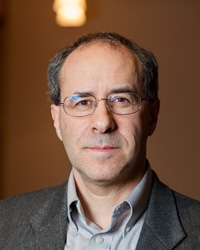
- This event has passed.
History of Modern Philosophy Group Talk (Michael Rosenthal, U of T)
Friday September 27, 2019, 3:00 pm - 5:00 pm
Event Navigation

Michael A. Rosenthal (PhD Chicago, 1996) holds the Grafstein Chair in Jewish Philosophy, with appointments in both the Department and the Anne Tannenbaum Centre for Jewish Studies.
Talk Title
Life as a Marionette: The Role of the Imagination in Spinoza’s Ethics, Part V
Abstract
The goal of Part V of the Ethics is to show that humans possess the power to be free. It must be a conception in which freedom is thoroughly compatible with necessity. It is difficult for us as finite beings to understand this idea and to act in accordance with it. Spinoza thinks that the main obstacle is the false idea of the free will, i.e., the power to act independently of any system of determinate causes. Spinoza does not think that we can overcome this prejudice, rooted in our ignorance, so easily. One of the most interesting features of his system is that at key points of his arguments Spinoza has recourse to the very images and passions that he finds problematic in order to produce effects that ultimately make us more reasonable. It may seem that when we arrive at Part V of the Ethics, the very last part in which he shows us that human freedom is tied to the power of the intellect, we should be able to dispense with these inadequate ideas and proceed solely according to reason. In this paper, however, I want to argue that perhaps the most important idea—the definition of freedom as acting according to the necessity of our own nature within a determined system—is so difficult to grasp that Spinoza still has to have recourse to the imagination to make sense of it. In the first propositions of Part V, Spinoza uses reason to sketch an imaginative picture of the self as a kind of marionette. This is what elsewhere he calls a “spiritual automaton.” It is not yet what it would be to live according to reason, but what it would be like to live—or as if we are living—according to reason. Even though, strictly speaking, this image is false, it nonetheless useful. This thought-image serves as a kind of aid to the individual to become free.
About the History of Philosophy Group
One of five departmental Research Interest Groups, the History of Philosophy Group is home to the History of Modern Philosophy Research Group, which focuses on the period, roughly, from Descartes to Kant.
SHARE